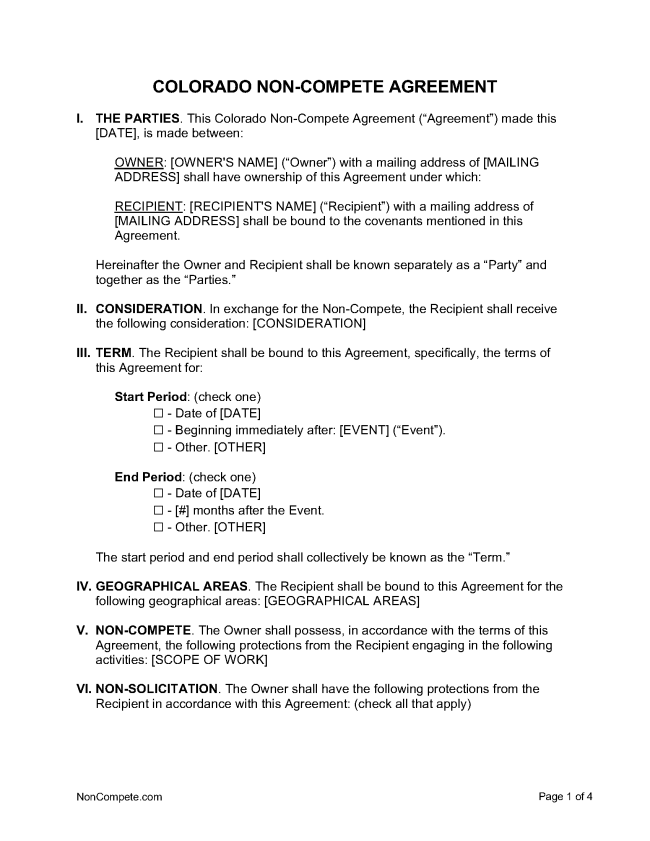A Colorado non-compete agreement is a legal document that prevents a party from working in a particular field. Like most states, Colorado places significant restrictions on non-compete agreements. It allows them only in certain circumstances, including as part of the sale of a business or for the protection of trade secrets. Along with these circumstances, the agreements also must contain limits on their duration and geographic reach.
Table of Contents |
Are Non-Competes Enforceable in Colorado?
Yes, under limited circumstances. Non-compete agreements are permitted only in the following situations:
- The agreement is part of the sale of a business;
- The agreement is for the protection of trade secrets;
- The agreement is intended to recover the expense of training an employee who served less than two years;
- Agreements covering executive and management personnel or professional staff to executive and management personnel.
Colo. Rev. Stat. Ann. § 8-2-113
Along with falling under one of these statutory exceptions, non-compete agreements are enforceable only if they are reasonable in duration and geographic reach. The agreement must be no broader than necessary to protect the legitimate interests of the person seeking the non-compete agreement and not impose a hardship on the person restrained. (Reed Mill & Lumber Co. v. Jensen (2006)).
Sale of Business
The purpose of permitting non-compete agreements ancillary to the sale of a business is to allow the purchaser to protect the “good will” of the business being purchased. (Gibson v. Eberle (1988)).
Goodwill is the expectation of repeated and continued patronage, and once the business protected by the agreement no longer exists, the agreement is no longer enforceable. (National Propane Corp. v. Miller (2000)).
The reasonableness of covenants not to compete that are ancillary to the sale of a business depends on whether the restraint on competition provides adequate protection to the buyer’s purchase of goodwill while imposing restrictions no more significant than necessary to protect the value of that goodwill. (Reed Mill & Lumber Co. v. Jensen (2006)).
Trade Secrets
For a covenant not to compete to fall within the trade secrets exception, the purpose of the covenant must be the protection of trade secrets, and the covenant must be reasonably limited in scope to the protection of those trade secrets. (Gold Messenger Inc. v. McGuay (1997))
The meaning of “trade secret” for covenants not to compete is defined by § 7-74-102(4) of Colorado’s Uniform Trade Secrets Act.
Recovery of Training or Education Expenses
Non-compete agreements premised around the recovery of training or education expenses should include a provision requiring reimbursement for those expenses. (Dresser Industries v. Sandvick (1984))
Executive and Management Personnel
There is no legislative definition of who qualifies as “executive or management personnel.” Instead, courts use the dictionary definitions of the terms to determine whether a given employee meets this statutory exception. A mid-level manager who supervised 50 employees, was near the top of the firm’s compensation plan, served in a decision-making position, and had some autonomy, has been considered “management personnel.” (Dish Network Corp. v. Altomari (2009)).
There are no legislative rules for whether an employee is considered “professional staff” to executive or management personnel, so the determination depends on the facts of each case. (Occusafe Inc. v Egg Rocky Flats (1995)).
Prohibited Professions
Attorneys cannot enter employment or partnership agreements that limit their right to practice after the relationship has ended, except for agreements concerning retirement benefits. Attorneys also cannot enter case settlements that restrict their ability to practice. CO ST RPC Rule 5.6.
Employment or partnership agreements that restrict the right of a physician to practice medicine after the business relationship has ended are generally prohibited. However, courts may enforce provisions requiring the payment of an amount of money reasonably related to the damage inflicted by a physician’s competition after a business relationship has ended. Colo. Rev. Stat. Ann. § 8-2-113(3)(a).
Terminating an Employee
If an employee is terminated shortly after signing a non-compete agreement, then the agreement may not be enforceable. (Lucht’s Concrete Pumping, Inc. v. Horner (2011)).
Burden of Proof
There is no general rule for enforcing non-compete agreements. Still, in the case of a request for a court ruling to enforce the agreement ahead of a trial, an employer has the burden of showing that a non-compete agreement falls within one of the statutory exceptions. (Phoenix Capital Inc. v. Dowell (2008)).
Continued Employment (Consideration)
Even without added pay or benefits, continued employment is sufficient consideration for enforcing a non-compete agreement. (Lucht’s Concrete Pumping, Inc. v. Horner (2011)).
Maximum Term
There is no statutory or judicially determined maximum. Covenants not to compete “for terms up to five years and within distances of 100 miles” are commonly upheld. (Reed Mill & Lumber Co. v. Jensen (2006)).
A noncompete clause that lacks a limitation of time or geography is unreasonable. (National Graphics Co. v. Dilley (1984)).
Blue Penciling (allowed)
Courts can set aside unreasonable restrictions in a non-compete agreement so that the rest of the agreement can survive. (National Graphics Co. v. Dilley (1984)).
